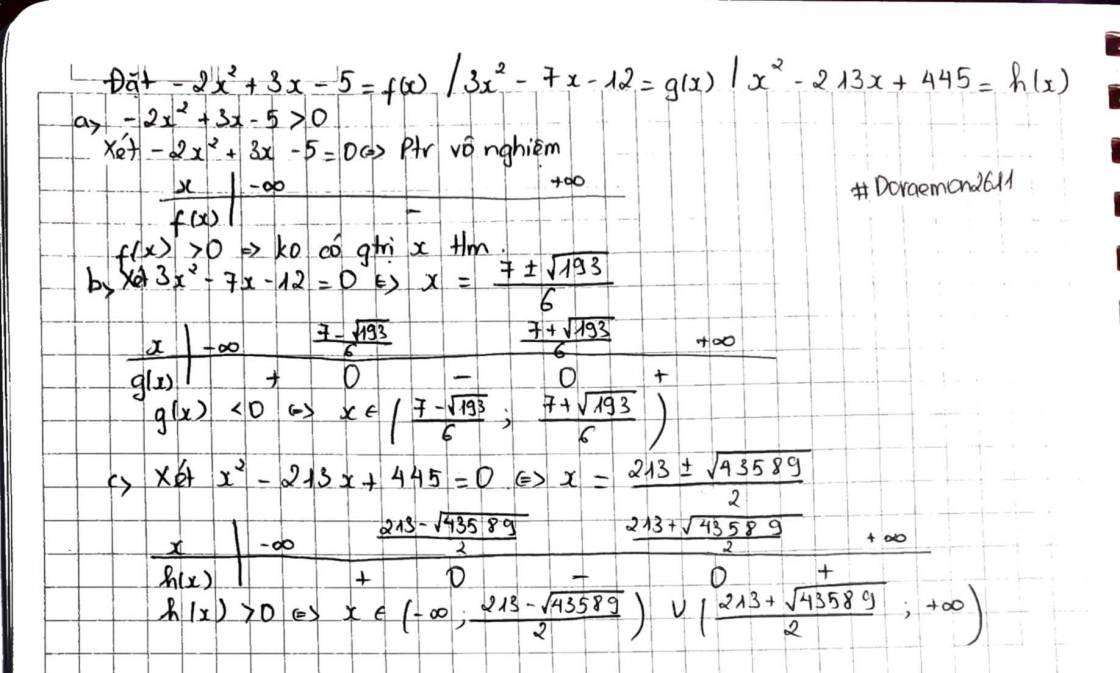Giải phương trình : x5 – 2x3 – 2x2 + 4 = 0.
Hãy nhập câu hỏi của bạn vào đây, nếu là tài khoản VIP, bạn sẽ được ưu tiên trả lời.


Ta có
P ( x ) = 2 x 3 − 3 x + x 5 − 4 x 3 + 4 x − x 5 + x 2 − 2 = x 5 − x 5 + 2 x 3 − 4 x 3 + x 2 + ( 4 x − 3 x ) − 2 = − 2 x 3 + x 2 + x − 2 Và Q ( x ) = x 3 − 2 x 2 + 3 x + 1 + 2 x 2
= x 3 + - 2 x 2 + 2 x 2 + 3 x + 1 = x 3 + 3 x + 1
Khi đó
P ( x ) − Q ( x ) = − 2 x 3 + x 2 + x − 2 − x 3 + 3 x + 1 = − 2 x 3 + x 2 + x − 2 − x 3 − 3 x − 1 = − 2 x 3 − x 3 + x 2 + ( x − 3 x ) − 2 − 1 = − 3 x 3 + x 2 − 2 x − 3
Chọn đáp án B

Ta có
P ( x ) = 2 x 3 − 3 x + x 5 − 4 x 3 + 4 x − x 5 + x 2 − 2 = x 5 − x 5 + 2 x 3 − 4 x 3 + x 2 + ( 4 x − 3 x ) − 2 = − 2 x 3 + x 2 + x − 2 Và Q ( x ) = x 3 − 2 x 2 + 3 x + 1 + 2 x 2 = x 3 + − 2 x 2 + 2 x 2 + 3 x + 1 = x 3 + 3 x + 1
Khi đó
M ( x ) = P ( x ) + Q ( x ) = − 2 x 3 + x 2 + x − 2 + x 3 + 3 x + 1 = − 2 x 3 + x 2 + x − 2 + x 3 + 3 x + 1 = − 2 x 3 + x 3 + x 2 + ( x + 3 x ) − 2 + 1 = − x 3 + x 2 + 4 x − 1
Bậc của M ( x ) = - x 3 + x 2 + 4 x - 1 l à 3
Chọn đáp án C

\(4x^2-5x-4\sqrt{x-1}-2=0\left(x\ge1\right)\)
\(\Leftrightarrow\left(4x^2-4x+1\right)-\left(x-1+4\sqrt{x-1}+4\right)=0\)
\(\Leftrightarrow\left(2x-1\right)^2-\left(\sqrt{x-1}+2\right)^2=0\)
\(\Leftrightarrow\left(2x-1-\sqrt{x-1}-2\right)\left(2x-1+\sqrt{x-1}+2\right)=0\)
\(\Leftrightarrow\left(2x-\sqrt{x-1}-3\right)\left(2x+\sqrt{x-1}+1\right)=0\)
\(\Leftrightarrow\left[{}\begin{matrix}\sqrt{x-1}=2x-3\\\sqrt{x-1}=-\left(2x+1\right)\end{matrix}\right.\)
\(\Leftrightarrow\left[{}\begin{matrix}x=2\left(tm\right)\\x\in\varnothing\end{matrix}\right.\)
Vậy với x = 2 thì thỏa mãn pt

Đặt t = x2 – 2x. Khi đó, phương trình đã cho trở thành:
2t2 – 3t + 1 = 0 ⇔ [ t = 1 t = 1 2
* Với t= 1 thì x2 – 2x = 1 hay x2 – 2x – 1 =0 có ac < 0 nên phương trình này có 2 nghiệm.
* Với t = 1 2 thì x 2 - 2 x = 1 2 ⇔ x 2 - 2 x - 1 2 = 0 có ac < 0 nên phương trình này có 2 nghiệm.
Do đó, phương trình đã cho có 4 nghiệm.
Chọn D.

a, Ta có : \(h\left(x\right)=f\left(x\right)+g\left(x\right)\)
hay \(h\left(x\right)=-x^5-7x^4-2x^3+x^2+4x+9+x^5+7x^4+2x^3+2x^2-3x-9\)
\(h\left(x\right)=3x^2+x\)
b, Đặt \(3x^2+x=0\Leftrightarrow x\left(3x+1\right)=0\Leftrightarrow\left[{}\begin{matrix}x=0\\x=-\dfrac{1}{3}\end{matrix}\right.\)
Vậy nghiệm của đa thức h(x) là x = -1/3 ; x = 0
c, Ta có : \(k\left(x\right)=f\left(x\right)-g\left(x\right)\)
hay \(k\left(x\right)=-x^5-7x^4-2x^3+x^2+4x+9-x^5-7x^4-2x^3-2x^2+3x+9\)
\(k\left(x\right)=-2x^5-14x^4-4x^3-x^2+7x+18\)
f(x)=-x5-7x4 -2x3+x2+4x+9
g(x)=x5+7x4+2x3+2x2-3x-9
Tính
a)h(x)=f(x)+g(x)
Ta có: h(x) = f(x) + g(x)
= (-x5-7x4 -2x3+x2+4x+9) + (x5+7x4+2x3+2x2-3x-9)
= (x5-x5) + (7x4-7x4) + (2x3-2x3) + (x2+2x2)+ (4x-3x) + (9-9)
=3x2+x
b)Tìm nghiệm của h(x)
h(x) = 0 <=> 3x2+x= 0
<=> x(3x+1) =0 <=> x= 0 hoặc x =-1/3
Vậy nghiệm của h(x) là x thuộc {0;-1/3}
c)k(x)=f(x)-g(x)
=(-x5-7x4 -2x3+x2+4x+9) - (x5+7x4+2x3+2x2-3x-9)
= (-x5-x5) + (-7x4-7x4) + (-2x3-2x3) + (x2-2x2) (4x+3x) + (9+9)
=-2x5-14x4 -4x3-x2+7x+19

Lời giải:
a.
$A(x)=-x^5-7x^4-2x^3+x^2+4x+9$
$B(x)=x^5+7x^4+2x^3+2x^2-3x-9$
b.
$A(x)+B(x)=(-x^5-7x^4-2x^3+x^2+4x+9)+(x^5+7x^4+2x^3+2x^2-3x-9)$
$=(-x^5+x^5)+(-7x^4+7x^4)+(-2x^3+2x^3)+(x^2+2x^2)+(4x-3x)+(9-9)=3x^2+x$
$A(x)-B(x)=(-x^5-7x^4-2x^3+x^2+4x+9)-(x^5+7x^4+2x^3+2x^2-3x-9)$
$=(-x^5-x^5)+(-7x^4-7x^4)+(-2x^3-2x^3)+(x^2-2x^2)+(4x+3x)+(9+9)=-2x^5-14x^4-4x^3-x^2+7x+18$

a) Thay m = -4 vào phương trình, ta có:
\(x^2+5x-6=0\)
\(\Leftrightarrow\left(x+6\right)\left(x-1\right)=0\)
\(\Leftrightarrow\left[{}\begin{matrix}x=-6\\x=1\end{matrix}\right.\)
KL: Vậy phương trình có tập nghiệm \(S=\left\{-6;1\right\}\) khi m = -4
b) Xét \(\Delta=5^2-4.1.\left(m-2\right)=25-4m+8=33-4m\)
Phương trình có 2 nghiệm phân biệt \(\Leftrightarrow33-4m>0\Leftrightarrow m< \dfrac{33}{4}\)
Theo định lý Vi-et, ta có: \(\left\{{}\begin{matrix}x_1+x_2=-5\\x_1.x_2=m-2\end{matrix}\right.\)
Để \(x_1^2+x^2_2-2x_1=25+2x_2\)
<=> \(\left(x_1+x_2\right)^2-2x_1x_2-2\left(x_1+x_2\right)-25=0\)
<=> \(\left(-5\right)^2-2\left(m-2\right)-2\left(-5\right)-25=0\)
<=> \(25-2m+4+10-25=0\)
<=> 2m = 14
<=> m = 7 (Tm)
Vậy m = 7 để phương trình có 2 nghiệm phân biệt x1, x2 thỏa mãn \(x_1^2+x^2_2-2x_1=25+2x_2\)


\(x^5-2x^3-2x^2+4=0\)
\(x^3\left(x^2-2\right)-2\left(x^2-2\right)=0\)
\(\left(x^3-2\right)\left(x^2-2\right)=0\)
\(\Rightarrow\orbr{\begin{cases}x^3-2=0\\x^2-2=0\end{cases}}\)
\(\Rightarrow\orbr{\begin{cases}x^3=2\\x^2=2\end{cases}}\)
\(\Rightarrow\orbr{\begin{cases}x=\varnothing\left(x\ne0với\forall x\right)\\x=\varnothing\left(x\ne0với\forall x\right)\end{cases}}\)
\(x^5-2x^3-2x^2+4=0\)
\(\Leftrightarrow\left(x^5-2x^3\right)-\left(2x^2-4\right)=0\)
\(\Leftrightarrow x^3\left(x^2-2\right)-2\left(x^2-2\right)=0\)
\(\Leftrightarrow\left(x^3-2\right)\left(x^2-2\right)=0\)
\(\Leftrightarrow\hept{\orbr{\begin{cases}x^3-2=0\Rightarrow x^3=2\Rightarrow x=8\\x^2-2=0\Rightarrow x^2=2\Rightarrow x=4\end{cases}}}\)
Vậy \(x\in\left\{4;8\right\}\)